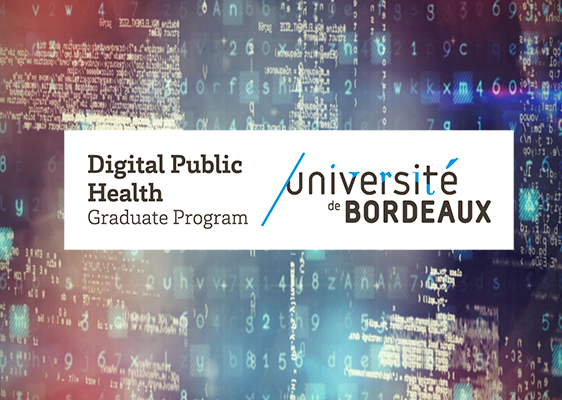|
|
Class 2022-2023 - Master 2 Public Health Data Science (PHDS)Online course plateform |
- Enseignant: Florence Lamarque
- Enseignant: Delphine Manceau
- Enseignant: Ilaria Montagni
- Enseignant: Carine Prevot
Introduction
This T.U. will provide the necessary basic tools for all the T.U.s of the program across the three core domains. In Biostatistics, core principles such as experimental design, probabilistic modeling and maximum likelihood estimation will be covered. In Medical Informatics, database design & management, notion of object programming as well as Parallel programming, Hadoop & cloud computing will be covered. Finally, general tools and ideas in Epidemiology, causality principles, reproducible science. Data Legislation as well as communicable & reproducible data science will be covered.
Coordinator: Boris Hejblum
Type of assessment: continuous assessment plus written exam. A catch-up session is envisaged during the first semester for those who fail the first session.
- Enseignant: Amadou Alioum
- Enseignant: Rabia Azzi
- Enseignant: Laurent Billot
- Enseignant: Sebastien Cossin
- Enseignant: Gayo Diallo
- Enseignant: Robin Genuer
- Enseignant: Boris Hejblum
- Enseignant: Florence Lamarque
- Enseignant: Karen Leffondre
- Enseignant: Delphine Manceau
- Enseignant: Camila Martinez
- Enseignant: Ilaria Montagni
- Enseignant: Fleur Mougin
- Enseignant: Joanne Pageze
- Enseignant: Antoine Pariente
- Enseignant: Carine Prevot
- Enseignant: Laura Richert
- Enseignant: Anais Rouanet
- Enseignant: Bruno Thiao Layel
- Enseignant: Rodolphe Thiebaut
- Enseignant: Frantz Thiessard
- Enseignant: Christophe Tzourio
- Enseignant: Linda Wittkop
Introduction
The use of digital tools is revolutionizing the world of cohorts: communication and recruitment via social networks, web-questionnaires and sensors allowing repeated measurements as close as possible to real life (data on physical activity, blood pressure and heart rate, diet...) are more and more used. In this T.U., the transformation of cohorts by digital tools will be shown using real case examples. A particular focus will be put on issues of sampling, causality and survival analysis in digital cohorts.
Coordinators: Karen Leffondré & Christophe Tzourio
Type of assessment: continuous assessment in teamwork through several critical reading sessions of scientific publications. Students will be asked to read in advance the articles and to comment them in class proposing new insights to advance research through digital cohorts.
- Enseignant: Florence Lamarque
- Enseignant: Delphine Manceau
- Enseignant: Ilaria Montagni
- Enseignant: Carine Prevot
Introduction
In this T.U. students will learn to understand, manage and analyze high dimensional "omics" data, such as gene polymorphism or gene expression (transcriptomics) data. Topics range from principles of experimental clinical trials with high dimensional omics data in small sample sizes to methods of gene-wise association analyses (GWAS) in large observational studies. By the use of case studies and hands-on computer programming to analyze real data during this unit, the students will acquire knowledge in dimension reduction methods, multiple testing procedures and longitudinal data modelling. Together with annotation visualisation techniques, this course will also also teach how to interpret and communicate results of omics analyses.
Coordinators: Laura Richert & Rodolphe Thiébaut
Type of assessment: continuous assessment in teamwork (students will be asked to perform data analyses based on examples seen in class) plus written exam. A catch-up session is envisaged for those who fail the first session of the written exam.
- Enseignant: Boris Hejblum
- Enseignant: Florence Lamarque
- Enseignant: Delphine Manceau
- Enseignant: Ilaria Montagni
- Enseignant: Carine Prevot
- Enseignant: Laura Richert
- Enseignant: Anais Rouanet
Introduction
This course will present the types, content, and architecture of the electronic data/databases that can be used for health evaluation and the methods to use them for this evaluation. The specificity of this use will lead to train on classification and terminologies used to represent health information in these electronic data, on the techniques and tools allowing enrich/account for the lack of clinical information (or other type) that can be present in these data. The goal of the course is to allow trainees identifying the electronic data that could be useful to answer a research question, conceiving the research protocol that would allow investigating this research question from such data, and coordinating a research project performed from these.
Coordinators: Antoine Pariente & Frantz Thiessard
Type of assessment: continuous assessment in teamwork. Students will be asked to perform data analyses based on examples seen in class.
- Enseignant: Florence Lamarque
- Enseignant: Delphine Manceau
- Enseignant: Ilaria Montagni
- Enseignant: Carine Prevot
Introduction
The course will give students the abilities to perform Public Health studies which integrate data from social networks and web forums, linked open data and mobile data. It will be driven by case-based teaching and practical hands-on experiences supported by conceptual and theoretical background. Attendees will use environmental and geo-tagged data, web forums data and large a large mobile data set (call detail records).
Coordinator: Gayo Diallo
Type of assessment: continuous assessment in teamwork. Students will be asked to work and comment on examples and datasets seen in class.
- Enseignant: Gayo Diallo
- Enseignant: Florence Lamarque
- Enseignant: Delphine Manceau
- Enseignant: Ilaria Montagni
- Enseignant: Carine Prevot
Introduction
This final e-learning course prepares students so that as graduates, they are capable of becoming immediate contributors in the workplace either in the academic or the industrial sector. Students learn to develop their entrepreneurial skills and also acquire an understanding of the societal and economic value created by digital public health data research.
Coordinator: Ilaria Montagni
Type of assessment: continuous assessment in teamwork and individually. Students will be asked to answer quizzes during all sections and to produce a video plus two written documents for the final evaluation.
- Enseignant: Florence Lamarque
- Enseignant: Delphine Manceau
- Enseignant: Ilaria Montagni
- Enseignant: Carine Prevot
